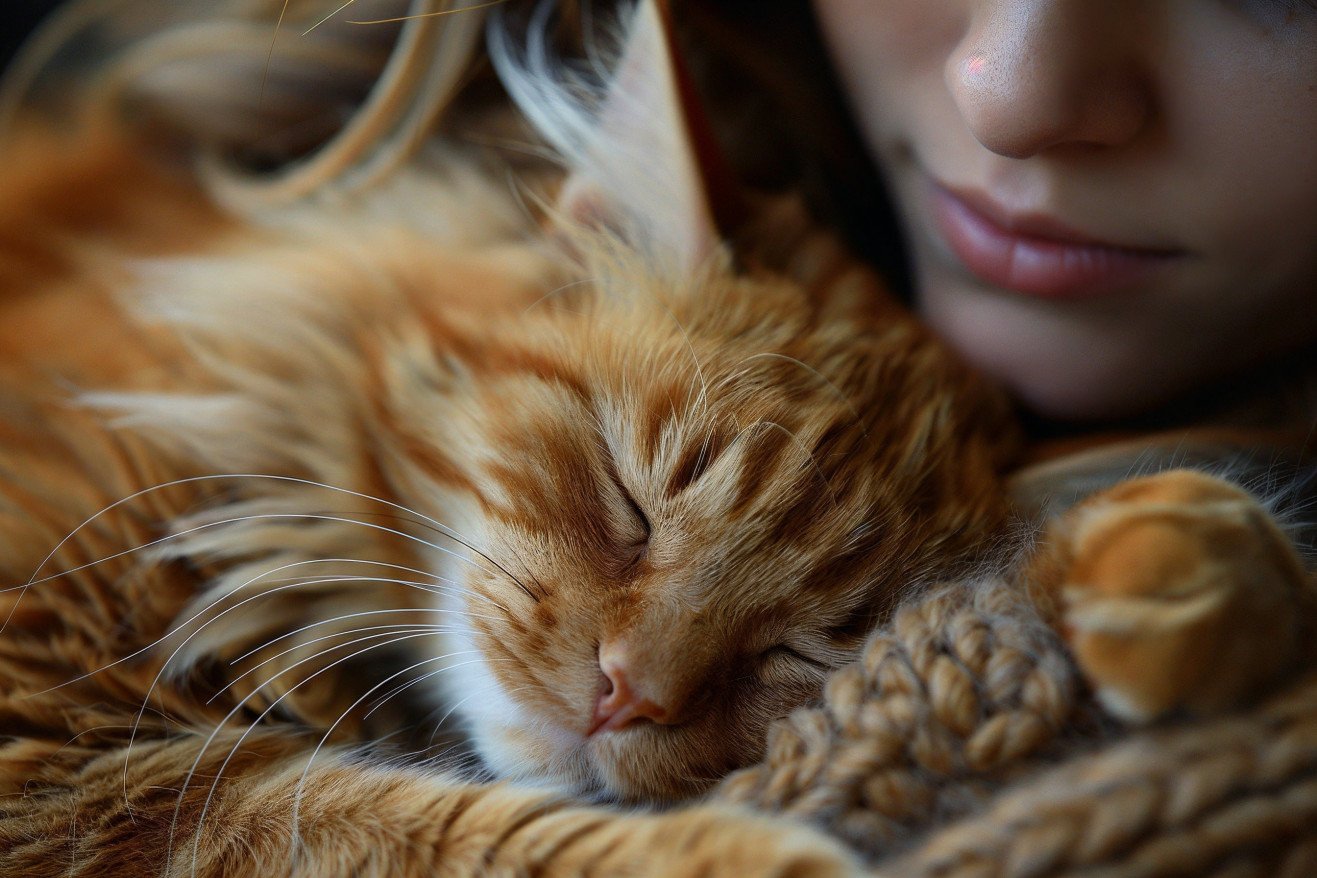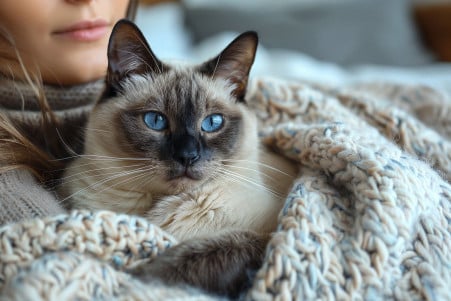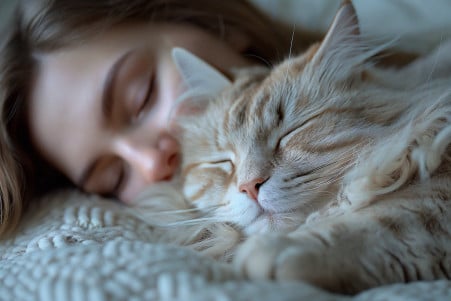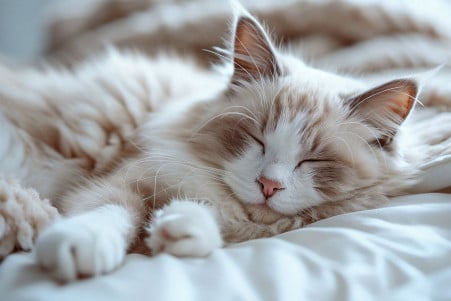Why Does My Cat Sleep on Top of Me? Key Reasons
15 May 2024 • Updated 14 May 2024

If you've ever wondered why your cat always has to be right on top of you when they sleep, you're not alone. It turns out that cats are social animals that have a strong bond with their human caregivers, and sleeping on top of you is a way to feel safe and secure while also marking you as part of their family.
This behavior is part of a larger set of sleep patterns and rituals that are influenced by cats' crepuscular activity and their roles as both predators and prey. This article will explore the scientific evidence from animal behavior, evolutionary biology, and veterinary medicine to explain the biological and adaptive reasons for your cat's tendency to sleep on top of you.
Why does my cat sleep pressed up against me?
Evolutionary Reasons for Cats' Sleeping Behaviors
Cats are crepuscular, meaning they are most active at dawn and dusk. This behavior is a result of cats' ancestral need to hunt prey that is active at those times, according to a study cited by ManyPets. Their polyphasic sleep cycle consists of several short naps during the day and night, with each nap lasting an average of 78 minutes according to the Sleep Foundation.
Sleeping in a safe, high place allows cats to avoid potential threats during sleep, a behavior that goes back to their evolutionary history. Sleeping near their human provides warmth, safety, and a good vantage point that fulfills these natural instincts. As Newsweek explains, the most important reason cats sleep with owners is for the sense of security, as "cats are most vulnerable and at their greatest risk of being attacked by a predator when they're sleeping." The human caregiver is an extra layer of protection.
When we consider the evolutionary reasons for cats sleeping on top of us, we can see that this feline behavior is rooted in a need for safety and security. This need is closely related to the next factor, which is the emotional bond between a cat and their human.
Attachment and Love: Why Cats Sleep on Their Owners
Cats will often sleep on or near the person they feel closest to, according to The Spruce Pets. So, when a cat sleeps on their owner, it's a clear indication of the cat's trust, security, and love. Some sleeping positions, like lying on their back, show that the cat feels especially secure with their owner, says PetMD.
Meanwhile, cats that sleep between their owner's legs or on their chest are looking for warmth and companionship, reports Purina. This kind of behavior helps to strengthen the bond between a cat and their owner.
The Pros and Cons of Sleeping With Your Cat
Sleeping with a cat can offer mutual comfort, protection, and emotional support. As the PD Insurance blog notes, the difference in body temperature between humans and cats can lead to a better night's sleep, and the rhythmic nature of a cat's purr has been shown to have soothing, therapeutic benefits. Studies have even found that cat owners have a 40% lower risk of heart attack.
That said, there are also some potential downsides to sleeping with a cat. According to the Sleep Foundation, sleeping with pets can expose people to allergens, germs, and parasites, and may disrupt sleep, especially for those with compromised immune systems. In addition, cats can be a danger to infants, as the Healthline article warns that "if the cat is startled or frightened, the baby can get bitten, scratched, or trampled on as the cat tries to run or jump away."
However, experts say that these risks can be managed with proper precautions, such as regular vet checkups, good bedding practices, and not allowing cats to sleep in the same room as infants or people with compromised immune systems. By being aware of these potential downsides and how to address them, pet owners can make an informed decision about whether to let their cats sleep in bed with them.
How to Create the Best Sleep Environment for Your Cat
To help your cat get the best sleep possible, it's important to make sure that they have a comfortable, consistent place to sleep. According to TheCatSite, cats can be very picky about where they sleep, and they will often choose the warmest, most secure location.
Make sure that you provide your cat with elevated places to sleep, like cat trees or window perches, so that they can feel safe and secure while they sleep. This is especially important since, as the PetMD article explains, cats are territorial animals and prefer vertical territory. You can also put your cat's bed near your bed to give them the comfort of sleeping close to you without having to sleep in the same bed.
Make sure that your cat has access to water, litter boxes, and any other essentials that they might need, since, according to the Union Lake Pet Services blog, cats will choose a place to sleep based on how safe and secure it makes them feel. You should also make sure that you eliminate any other stressors that could be causing your cat to have trouble sleeping.
By making sure that your cat has a comfortable, consistent place to sleep that meets their natural needs, you can help them get the best sleep possible.
Being Mindful of Your Cat's Sleep Patterns
Because cats may change where they want to sleep often, it's important to be mindful and willing to adjust, as pointed out by TheCatSite. Don't wake your cat up when they're sleeping, as they need to be able to get good rest in order to be healthy. If your cat doesn't want to sleep with you, make sure that they have a separate, comfortable place to sleep.
Watching where and how your cat sleeps can help you understand their needs and wants better, according to the CatNip Times article. Some cats may sleep with their owners because they want to stay warm, feel safe, or mark their territory, while others may just want the company. In the end, make sure that you're respecting your cat's choices and letting them sleep where they feel safe and comfortable.
By creating a low-stress environment that meets your cat's changing sleep needs, you can help ensure that you and your cat have a happy, healthy relationship. This may even have health benefits for you, since a study from the University of Minnesota showed that people who own cats have a 30% lower chance of dying from a heart attack.
Conclusion: Enjoying the Feline Sleep Companion
Cats sleeping on or near their owners is a natural behavior that has evolved from the wild. It shows that the cat feels close to and trusts its owner. While there are potential benefits and risks, proper precautions can mitigate concerns.
Ultimately, respecting your cat's sleep preferences is key to a harmonious relationship. Enjoy your feline sleep companion, and the warmth and comfort they provide.


